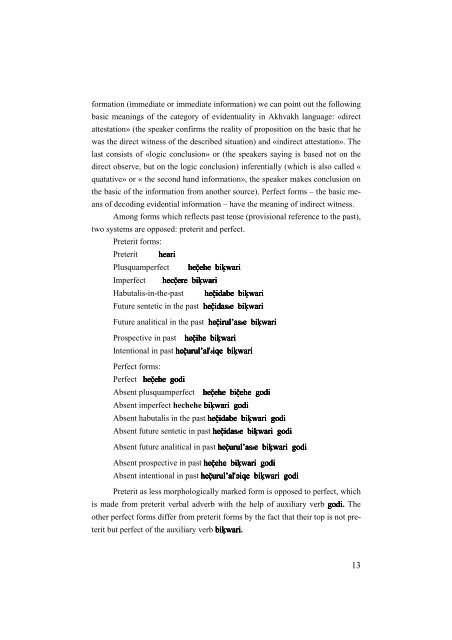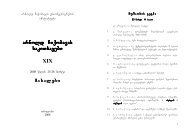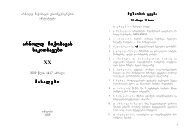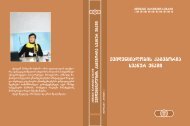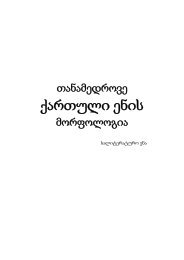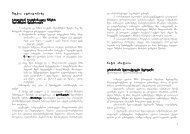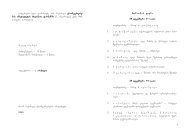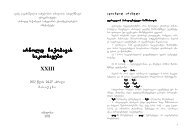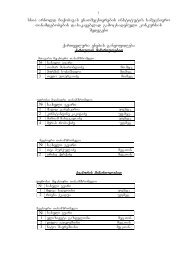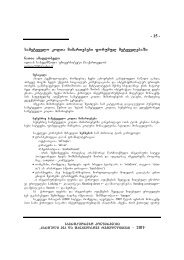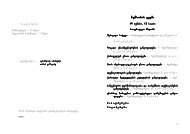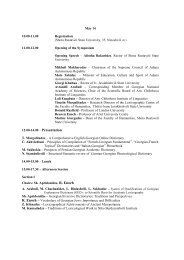5 r. a b a S i a (Tbilisi) bgeraTSesatyvisobis erTi rigisaTvis qarTvelur ...
5 r. a b a S i a (Tbilisi) bgeraTSesatyvisobis erTi rigisaTvis qarTvelur ...
5 r. a b a S i a (Tbilisi) bgeraTSesatyvisobis erTi rigisaTvis qarTvelur ...
You also want an ePaper? Increase the reach of your titles
YUMPU automatically turns print PDFs into web optimized ePapers that Google loves.
formation (immediate or immediate information) we can point out the following<br />
basic meanings of the category of evidentuality in Akhvakh language: «direct<br />
attestation» (the speaker confirms the reality of proposition on the basic that he<br />
was the direct witness of the described situation) and «indirect attestation». The<br />
last consists of «logic conclusion» or (the speakers saying is based not on the<br />
direct observe, but on the logic conclusion) inferentially (which is also called «<br />
quatative» or « the second hand information», the speaker makes conclusion on<br />
the basic of the information from another source). Perfect forms – the basic means<br />
of decoding evidential information – have the meaning of indirect witness.<br />
Among forms which reflects past tense (provisional reference to the past),<br />
two systems are opposed: preterit and perfect.<br />
Preterit forms:<br />
Preterit<br />
hear<br />
ari<br />
Plusquamperfect<br />
heyehe bik…ari<br />
Imperfect<br />
hecyere bik…ari<br />
Habutalis-in-the-past<br />
heyidabe bik…ari<br />
Future sentetic in the past heyidas<br />
yidas´e bik…ari<br />
Future analitical in the past heyirul‡as<br />
as´e bik…ari<br />
Prospective in past<br />
heyihe bik…ari<br />
Intentional in past heyurul‡al<br />
alÀ´<br />
À´iƒe e bik…ari<br />
Perfect forms:<br />
Perfect heyehe godi<br />
Absent plusquamperfect<br />
heyehe biyehe godi<br />
Absent imperfect hechehe bik…ari godi<br />
Absent habutalis in the past heyida<br />
dabe<br />
bik…ari<br />
godi<br />
Absent future sentetic in past heyida<br />
das´e bik…ari<br />
godi<br />
Absent future analitical in past heyurul<br />
rul‡as´e bik…ari<br />
godi<br />
Absent prospective in past heyehe<br />
bik…ari<br />
godi<br />
Absent intentional in past heyuru<br />
rul‡alÀˆiƒe bik…ari<br />
godi<br />
Preterit as less morphologically marked form is opposed to perfect, which<br />
is made from preterit verbal adverb with the help of auxiliary verb godi<br />
di. The<br />
other perfect forms differ from preterit forms by the fact that their top is not preterit<br />
but perfect of the auxiliary verb bik…ari<br />
ari.<br />
13


